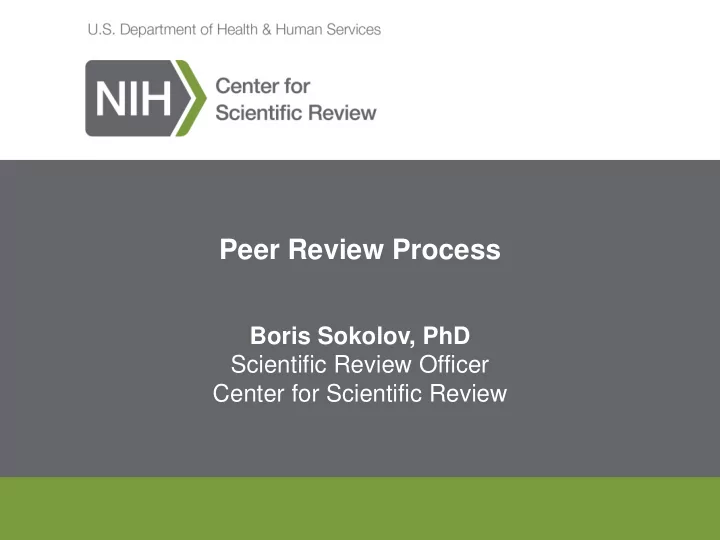

Peer Review Process Boris Sokolov, PhD Scientific Review Officer Center for Scientific Review
Key Dates for Application Review • Application Due – July 19, 2017 • Scientific Merit Review – January, 2018 • Advisory Council Review – May 2018
Application Due – July 19, 2017 • Continuous submission does not apply • Late submission (two week window of consideration) may apply (NOT-OD-15-039), e.g. : • Death, severe illness of the PI • Recent Study Section service • Problems with computer systems or system-to-system grant submission service will not be considered • No Advance Permission Is Given for Late Applications
Application must be completed at the time of submission • No changes can be made after submission • No post-submission supplemental materials except: – those that derive from unforeseen circumstances – acceptance of a manuscript • 30 days prior to the meeting • Must be submitted or approved by your Grant Signing Official • Reviewers are not obligated to read post submission materials.
CONFLICTS • We make all efforts to avoid any real or perceived conflicts (as defined by NIH policies). • Indicate potential conflict in your cover letter
CONFLICTS • Excluded from the Review Meeting: – Anyone involved in any of the applications – People from the tobacco industry
CONFLICTS Excluded from the review of a specific application • Collaborators/Former collaborators (last three years) • Mentors/Mentees (10 years or forever) of anybody involved in your application • Everyone from an Institution where any of the application’s personnel works
Scored Review Criteria (same as listed in FOA) • Overall Impact – Reviewers provide an overall priority score to reflect their assessment of the likelihood for the project to exert a sustained, powerful influence on the research field(s) in consideration of the following review criteria and additional review criteria • Significance – Does the project address an important issue or a critical barrier in the field? If the aims of the project are achieved, how will scientific knowledge and/or technical capability be improved? How will successful completion of the aims affect the concepts, methods, and technologies related to the manufacture, distribution, and marketing of tobacco products? • Investigator • Innovation – Does the application challenge and seek to shift current research in the field of tobacco science as it relates to the manufacture, distribution, and marketing of tobacco products? Is a refinement, improvement, or new application of theoretical concepts, approaches or methodologies, or instrumentation proposed? Will the outcomes of the project provide new information to further develop the knowledge base that informs the manufacture, distribution, and marketing of tobacco products in order to protect public health? • Approach • Environment
Additional Review Criteria (TCORS) (These are not given individual scores but will be considered in the review) – Center Coordination and Synergy – Research Potential to Inform Regulatory Decision Making – Career Enhancement Plan
Additional Review Criteria • Standard aspects of NIH applications, including: – Protections for Human Subjects – Vertebrate Animals – Biohazards – Resource Sharing Plans – Authentication of Key Biological and/or Chemical Resources
Review Contact If you have additional questions specifically about the review process for these applications, please contact: Boris Sokolov, PhD: Bsokolov@csr.nih.gov Tel 301-408-9115
NIH Initiative to Enhance Reproducibility through Rigor and Transparency • Make sure that the Scientific Rigor and Transparency initiative received appropriate attention and that the Scientific Premise, Scientific Rigor, Consideration of Sex and other biological variables and Authentication of resources are very carefully addressed.
Additional Review Criteria (TCORS) Center Coordination and Synergy: • Is the Integrative Theme of the proposed Center clearly evident across Research Projects? • Are TCORS Scientific Domains clearly specified? • Is there evidence of the proposed Center's coordination/collaboration across the TCORS components (Cores, Research Projects)? • Are there advantages of conducting the proposed research as a center program rather than through separate research efforts? Will the research efforts taken together have more impact on the field than each separate project conducted in isolation? Will the research proposed in individual projects be enhanced by the Center? • Are timelines and milestones in-place that will allow an evaluation of progress to be made
Recommend
More recommend